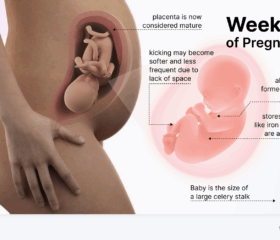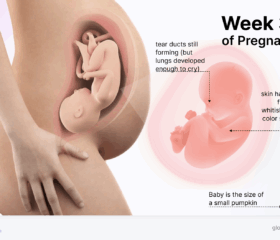Lightning Crotch: What It Is, Causes, and Treatment
Are you getting a sharp, zapping pain deep in your pelvis or vagina during pregnancy? If so, you've probably just been struck by lightning crotch.

Pregnancy comes with its fair share of surprises, but lightning crotch might be the most electrifying one. While the name may sound like a risqué superpower, lightning crotch is actually a common (albeit uncomfortable) experience for many pregnant women, especially in the third trimester.
However, it can be alarming to feel any sort of pain during pregnancy. To help put your mind at ease, here’s a list of its causes and some advice on how to manage lightning crotch.
What does lightning crotch feel like?
If you get a brief stabbing or electric-shock-like sensation in your nether regions, then lightning crotch is probably the culprit. Many women describe it as a: 1
- Sharp, shooting pain, like an electric shock
- Stinging feeling
- Pins-and-needles sensation
- Brief pain that’s stronger than menstrual cramps
Regardless of exactly how it feels, the pain typically only lasts a few seconds, but it can be intense enough to take your breath away. Since there are usually no warning signs, it can often catch you off guard, too.
What causes lightning crotch?
There’s no single, definitive answer as to why some women experience lightning crotch. However, most theories point to two causes:
Hormonal changes
During pregnancy, you experience a lot of hormonal changes. In particular, your body produces a lot of relaxin, a hormone that relaxes your muscles, joints, and ligaments in your pelvis. This helps your body stretch to accommodate your growing baby and to prepare for labor. 2
However, as relaxin also weakens your pelvic floor, you may be more susceptible to feeling pain in your pelvis or groin area.
Baby’s position
In the weeks leading up to delivery, your baby prepares for her birthday by dropping lower into your pelvis (a process called “lightening”). 3
All that extra baby weight compresses sensitive nerves and puts a lot of pressure on your cervix, vagina, and pelvic structures, including the ligaments and muscles loosened by relaxin. 1 4 This triggers that shooting pain, which can get worse whenever your baby stretches, shifts, and kicks. It’s like she’s hitting your funny bone—but in your pelvic region.
How does lightning crotch compare to other pregnancy pains?
Lightning crotch is the layman’s term for symphysis pubis dysfunction (SPD), a type of pelvic girdle pain (PGP).
It can be hard to tell the difference between SPD and all those other aches that come with pregnancy. Here are a few other types of (unfortunately common) pains that you shouldn’t confuse it with:
- Round ligament pain: This is also caused by relaxin-loosened ligaments, and manifests as pain in your lower abdomen, hips, and groin, usually set off by quick movements, like when you get up from a chair, roll over in bed, or sneeze. 5 By contrast, lightning crotch mostly affects your pubic and vaginal area.
- Sciatica: This nerve pain radiates from your lower back down your leg and can, in fact, affect your hips (which are part of your pelvis). 6 However, the pain of lightning crotch is localized to your pelvic area.
Is lightning crotch a sign of labor?
Typically, lightning crotch strikes in the later stages of pregnancy, so it’s natural to wonder if those sharp pains mean that you’re going into labor. 1 Fortunately or unfortunately, lightning crotch is generally not a sign of impending childbirth.
Labor pains (uterine contractions) are rhythmic and get stronger and closer together over time. They’re also usually accompanied by a host of other signs that you’re going into labor, like your vaginal discharge being bloody, your water breaking, and your back and abdomen cramping. 7
In contrast, lightning crotch pain does not cause back pain or follow any rhythm. It’s random and only lasts a few seconds. While it can be triggered by your baby’s descent, it doesn’t necessarily mean labor is imminent.
How to get relief from lightning crotch
Although there’s no guaranteed way to prevent or stop lightning crotch or other forms of pelvic pain during pregnancy, there are a few things you can try to manage the discomfort.
Light exercise, like walking or swimming, is a great way to decompress those pinched nerves in your pelvis, while resting gives your body time to recover from lightning crotch episodes. You should also: 8
- Change positions: Sometimes, all you need to do is shift your position—slowly and carefully, of course—to relieve pressure on the nerves. Try standing up if you’re sitting, or vice versa. On that note, avoid falling asleep in any of the wrong positions for pregnancy (e.g., flat on your back), and try side-sleeping instead.
- Wear a belly band: A support band can provide relief by lifting the weight of your baby, which reduces pressure on your pelvic muscles and nerves. 1
- Maintain good posture: Physical and hormonal changes (like the aforementioned relaxin) can make it harder not to slouch. Try engaging your abdominal muscles while keeping your pelvis in proper alignment to lessen the strain on your pelvic area.
- Warm bath or massage: A warm (not hot) bath and a massage from a prenatal massage specialist can soothe tight muscles and strained joints, helping you unwind.
The good news is that lightning crotch starts clearing up once you give birth. It may take a few months for the symptoms to completely go away. Unfortunately, you’ll probably still need to wait a bit longer before you get the sweet relief of your baby no longer mashing on your reproductive system.
If your discomfort is severe, you can look into safe over-the-counter pain relief options, such as acetaminophen (Tylenol). However, while Tylenol is generally safe while you’re pregnant, always speak to your doctor before using it, as with any other medications during pregnancy.
When to see a doctor
While lightning crotch is usually harmless, it’s important to talk to your doctor or midwife if the pain is persistent (lasts for more than a minute) or gets worse. You should also speak with them if lightning crotch is accompanied by symptoms like: 1
- Bad headaches
- Fever
- Dizziness
- Fluid leaking from your vagina (the volume will be higher than your normal pregnancy discharge, and the consistency will be more watery)
These symptoms might not necessarily mean there’s anything more serious going on, but you should still get checked over by your doctor right away.
Additionally, always be on the lookout for the more obvious labor signs, such as vaginal bleeding, your water breaking, and contractions.
Final thoughts
While lightning crotch can strike without warning, it’s usually more of a temporary inconvenience than a genuine cause for concern. By understanding what causes it and how to manage the discomfort, you can push through pregnancy more easily.
Hang in there—if you can survive these mini-lightning strikes, you’re definitely prepared for whatever pregnancy throws at you next.
Article Sources
- Penn Medicine Lancaster General Health. "Real Talk: Lightning Crotch Pain During Pregnancy" Retrieved April 24, 2025.
- You and Your Hormones. "Relaxin" Retrieved April 24, 2025.
- Johns Hopkins Medicine. "The Third Trimester" Retrieved April 24, 2025.
- Hypermobility. "Hormones and hypermobility" Retrieved April 24, 2025.
- MedlinePlus. "Aches and pains during pregnancy" Retrieved April 24, 2025.
- Penn Medicine. "Sciatica" Retrieved April 24, 2025.
- Northwestern Medicine. "What Are the Signs of Labor?" Retrieved April 24, 2025.
- American Pregnancy Association. "Lightning Crotch Pain During Pregnancy" Retrieved April 24, 2025.







